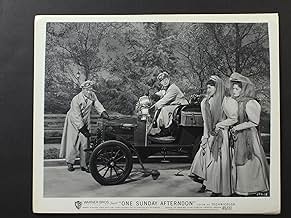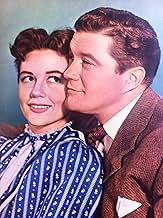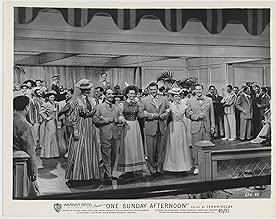Biff Grimes passe dix ans à regretter de ne pas avoir épousé Virginia Brush, la fille de ses rêves. Virginia s'est enfuie et a épousé son meilleur ami - lui brisant le coeur. La meilleure am... Tout lireBiff Grimes passe dix ans à regretter de ne pas avoir épousé Virginia Brush, la fille de ses rêves. Virginia s'est enfuie et a épousé son meilleur ami - lui brisant le coeur. La meilleure amie de Virginia, Amy, console Biff.Biff Grimes passe dix ans à regretter de ne pas avoir épousé Virginia Brush, la fille de ses rêves. Virginia s'est enfuie et a épousé son meilleur ami - lui brisant le coeur. La meilleure amie de Virginia, Amy, console Biff.
Don DeFore
- Hugo Barnstead
- (as Don De Fore)
Layne Arlene
- Henry's Wife
- (uncredited)
Gail Bonney
- Vocalist
- (uncredited)
Tex Brodus
- Dancer on Boat
- (uncredited)
Doria Caron
- Jasper's Wife
- (uncredited)
Chester Conklin
- Clerk
- (uncredited)
Virginia Cruzon
- Girl on Steps
- (uncredited)
Roy Damron
- Yale Boy
- (uncredited)
Tom Dugan
- Sign Painter
- (uncredited)
Ralph Dunn
- Charlie Brown
- (uncredited)
Mary Field
- Barnstead's Secretary
- (uncredited)
Dorothy Ford
- Daisy
- (uncredited)
Histoire
Le saviez-vous
- AnecdotesPreviously filmed as One Sunday Afternoon (1933) with Gary Cooper and Fay Wray, and as La Blonde framboise (1941) with James Cagney and Olivia de Havilland.
- ConnexionsReferenced in Suspense: Dead Ernest (1949)
- Bandes originalesGirls Were Made to Take Care of Boys
(uncredited)
Written by Ralph Blane
Performed by Dorothy Malone (dubbed by Marion Morgan)
Commentaire en vedette
Raoul Walsh returned to the same source material that he had explored seven years before when he directed Warner Brothers' One Sunday Afternoon in 1948.
Previously titled The Strawberry Blonde, starring James Cagney at the peak of his career as Biff Grimes, a pugnacious dentist in turn-of-the-century New York City who fantasizes about the title character, it, in turn, had been a remake of a 1933 Paramount production with the same title as the '48 version. That version had featured a young somewhat gawky Gary Cooper playing Grimes.
The '48 version, with Dennis Morgan now playing the dentist, was updated in two respects. It was turned into a partial musical to take advantage of its star's musical talents, and was filmed, impressively, in Technicolour. No matter whatever flaws this third version had, it was a handsome looking production.
The musical numbers are pleasant but bland and, quite frankly, could have used the memorable song "The Band Played On," as heard repeatedly in the Cagney version.
The cast of the '48 version (which includes Dorothy Malone in the role of Amy Lind, previously played by Olivia De Havilland in the '41 version, along with Janis Paige replacing Rita Hayworth as the title character, and Don DeFore in the Jack Carson role as chief protagonist) strives for adequacy but truly pales next to the memorable performances of the first Walsh version. Completely jettisoned from this version is the role of the dentist's rogue father, previously cheerfully played by Alan Hale. Almost for old time's sake, however, Hale's son, Alan Jr., has a small supporting role.
Looking ill at ease in this version's earlier scenes is star Dennis Morgan. Morgan had a natural cheerful, laid back charm and watching him play a character who is impulsive and pugnacious (a natural piece of casting for Cagney) is painful, to say the least. Morgan is more comfortable when he has the opportunity to sing, which he does with his usual charm.
Janis Paige makes little impression as "the strawberry blonde," the object of all men's desires, is this film, certainly nothing to compare to Hayworth seven years before. Don DeFore, while no Jack Carson, is not bad in the role of conniving Hugo Barnstead, while Dorothy Malone, as patient, loving Amy, the girl who is the real gem in the film, is reasonably touching in her role. She doesn't bring the same depth and warmth that De Havilland had but it's still a commendable performance.
In retrospect, director Walsh perhaps returned once to the well once too often with this production. Aside from the '41 version of Strawberry Blonde, Walsh, who had been raised as a boy during the Gay '90s, had a special affinity for creating nostalgic films of that era. The '41 Blonde is a minor under appreciated masterpiece but Walsh had made a few other memorable excursions into that era, as well, with 1933's The Bowery, 1936's Klondike Annie, with Mae West, and, best of all, 1942's Gentleman Jim, a rollicking affair, and another minor masterpiece, marking Errol Flynn in one of the most charismatic performances of his career.
This '48 version of One Sunday Afternoon can best be described as a rather bland time waster, hardly representative of Walsh at his best. Then, again, there's only so much the director can do when he has a willing but lesser league cast of players. There is no Cagney anywhere in sight of this production, and he is a talent that is sorely missed.
Previously titled The Strawberry Blonde, starring James Cagney at the peak of his career as Biff Grimes, a pugnacious dentist in turn-of-the-century New York City who fantasizes about the title character, it, in turn, had been a remake of a 1933 Paramount production with the same title as the '48 version. That version had featured a young somewhat gawky Gary Cooper playing Grimes.
The '48 version, with Dennis Morgan now playing the dentist, was updated in two respects. It was turned into a partial musical to take advantage of its star's musical talents, and was filmed, impressively, in Technicolour. No matter whatever flaws this third version had, it was a handsome looking production.
The musical numbers are pleasant but bland and, quite frankly, could have used the memorable song "The Band Played On," as heard repeatedly in the Cagney version.
The cast of the '48 version (which includes Dorothy Malone in the role of Amy Lind, previously played by Olivia De Havilland in the '41 version, along with Janis Paige replacing Rita Hayworth as the title character, and Don DeFore in the Jack Carson role as chief protagonist) strives for adequacy but truly pales next to the memorable performances of the first Walsh version. Completely jettisoned from this version is the role of the dentist's rogue father, previously cheerfully played by Alan Hale. Almost for old time's sake, however, Hale's son, Alan Jr., has a small supporting role.
Looking ill at ease in this version's earlier scenes is star Dennis Morgan. Morgan had a natural cheerful, laid back charm and watching him play a character who is impulsive and pugnacious (a natural piece of casting for Cagney) is painful, to say the least. Morgan is more comfortable when he has the opportunity to sing, which he does with his usual charm.
Janis Paige makes little impression as "the strawberry blonde," the object of all men's desires, is this film, certainly nothing to compare to Hayworth seven years before. Don DeFore, while no Jack Carson, is not bad in the role of conniving Hugo Barnstead, while Dorothy Malone, as patient, loving Amy, the girl who is the real gem in the film, is reasonably touching in her role. She doesn't bring the same depth and warmth that De Havilland had but it's still a commendable performance.
In retrospect, director Walsh perhaps returned once to the well once too often with this production. Aside from the '41 version of Strawberry Blonde, Walsh, who had been raised as a boy during the Gay '90s, had a special affinity for creating nostalgic films of that era. The '41 Blonde is a minor under appreciated masterpiece but Walsh had made a few other memorable excursions into that era, as well, with 1933's The Bowery, 1936's Klondike Annie, with Mae West, and, best of all, 1942's Gentleman Jim, a rollicking affair, and another minor masterpiece, marking Errol Flynn in one of the most charismatic performances of his career.
This '48 version of One Sunday Afternoon can best be described as a rather bland time waster, hardly representative of Walsh at his best. Then, again, there's only so much the director can do when he has a willing but lesser league cast of players. There is no Cagney anywhere in sight of this production, and he is a talent that is sorely missed.
- tjhodgins
- 10 août 2012
- Lien permanent
Meilleurs choix
Connectez-vous pour évaluer et surveiller les recommandations personnalisées
Détails
- Date de sortie
- Pays d’origine
- Langues
- Aussi connu sous le nom de
- В один воскресный день
- Lieux de tournage
- société de production
- Consultez plus de crédits d'entreprise sur IMDbPro
Box-office
- Budget
- 2 000 000 $ US (estimation)
- Durée1 heure 30 minutes
- Rapport de forme
- 1.37 : 1
Contribuer à cette page
Suggérer une modification ou ajouter du contenu manquant

Lacune principale
By what name was One Sunday Afternoon (1948) officially released in Canada in English?
Répondre































